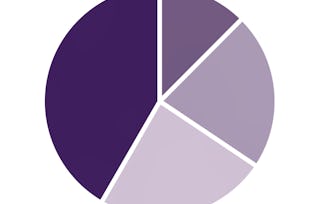This course provides the essential mathematics required to succeed in the finance and economics related modules of the Global MBA, including equations, functions, derivatives, and matrices. You can test your understanding with quizzes and worksheets, while more advanced content will be available if you want to push yourself.

Quantitative Foundations for International Business

Quantitative Foundations for International Business
This course is part of International Business Essentials Specialization

Instructor: George Kapetanios
Access provided by ExxonMobil
14,819 already enrolled
424 reviews
Skills you'll gain
Details to know

Add to your LinkedIn profile
10 assignments
See how employees at top companies are mastering in-demand skills

Build your subject-matter expertise
- Learn new concepts from industry experts
- Gain a foundational understanding of a subject or tool
- Develop job-relevant skills with hands-on projects
- Earn a shareable career certificate

There are 4 modules in this course
Although financial models are theoretical frameworks, we often use mathematical tools to work with these models. Mathematical models usually consist of a set of equations, which are designed to describe the structure of the model, and whose solution determines the importance of variables. This week, we will look at equations, including the basic terminology, and the rules for solving equations requiring more than one operation.
What's included
10 videos2 readings3 assignments
Functions are important in every area of pure and applied mathematics, including mathematics applied to economics, finance and business. For example, the language of economic analysis is full of terms like demand and supply functions, cost functions, production functions, consumption functions, and so on. This week, we will present a discussion of functions of one real variable, illustrated by some economic examples. Remember- one variable is a function of another if the first variable depends upon the second.
What's included
20 videos2 assignments
An important topic in many scientific disciplines- including economics- is the study of how quickly quantities change. The concept used to describe the rate of change of a function is known as the derivative. In this lecture, we will define the derivative of a function, and share some of the important rules for calculating it.
What's included
21 videos2 assignments
The analysis and even the comprehension of systems of linear equations is much easier when we use key mathematic concepts such as matrices, vectors, and determinants. This week, we’ll introduce these concepts and explain their application to economic models
What's included
16 videos3 assignments
Earn a career certificate
Add this credential to your LinkedIn profile, resume, or CV. Share it on social media and in your performance review.
Instructor

Offered by
Why people choose Coursera for their career

Felipe M.

Jennifer J.

Larry W.

Chaitanya A.
Learner reviews
- 5 stars
58.49%
- 4 stars
18.16%
- 3 stars
8.96%
- 2 stars
5.89%
- 1 star
8.49%
Showing 3 of 424
Reviewed on May 18, 2019
Good Course, but I would want the examples to stay on screen as they are being presented.
Reviewed on May 16, 2019
Excellent course giving intuitive insights into derivatives, matrices and linear algebra. Lays the foundation of quantitative modelling. Very useful.
Reviewed on Nov 27, 2021
it was great opportunity to join this class and I have learned a lot and achieved what I was looking for thanks for great time regards
Explore more from Business

University of London

University of London

University of London

University of London

